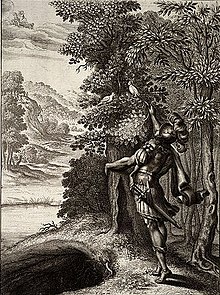Golden Bough (mythology)

The Golden Bough is one of the episodic tales written in the epic Aeneid, book VI, by ancient Roman poet Vergil (70-19 BC), which narrates the adventures of the Trojan hero Aeneas after the Trojan War.[1][2]
Story
While Troy was being destroyed in its last battle against the Greeks, Aeneas leaves the city and leads a sailed quest to find a new and Hesperian home.[3] In this mission, guided by prophet Helenus, Aeneas arrives in Italy where he intends to found a city to his people. Once there, Deiphobe, the sibyl of Cumae, then an elder with seven hundred years of age at an Apollo’s temple, consents to escort him into a journey through the underworld to comply with a requested wish of the "shade" of his deceased father.[4][1]

Before entering Hades, Deiphobe assigns Aeneas to obtain the bough of gold, which grows near in the woods around her cave, and should be given as a gift for Proserpina, the queen of Pluto, king of the underworld. In the forest, to aid Aeneas in this difficult task, two doves are sent from his mother goddess Venus, which helped him to find the tree. When Aeneas tears off the bough, immediately a second one of gold springs up, which is a good omen, otherwise, as said by sibyl, the coming endeavor would fail.[5][1]
Soon after started their descent to the underworld, the sibyl exhibits the golden bough to Charon who only then allows them to enter his boat and cross the Stygian river. In the other side, she casts a drugged cake to the three-headed watchdog Cerberus, which swallows it and makes him fall sleep.[6] Once there in the dark world, Aeneas tries talk to some shades, and hears the Sybil speak of places, like the Tartarus, where he saw a large prison, fenced by a triple wall, with wicked men being punished, and bordered by the fiery river Phlegethon. At the Pluto’s palace, the hero puts the golden bough on the arched door, and follows to the Elysian Fields, the abode of those who had rightful and useful lives.[7][1]
Anchises, the father of Aeneas, is finally found in the greenly and sunny Elysium, where also flows the beautiful river Eridanus. The hero attempts three times to hug his father but has no success. He is like thin air, or empty dreams.
In spite of this, they have a happy encounter and Anchises tells to his son about the nearby river Lethe, the river of forgetfulness, where a multitude of spirits waited to born, and live on Earth. Over there were those who would be the descendants of Aeneas, and those who would live in the future Roman Empire, such as Romulus, Camillus, Fabillus, and the Caesars. Anchises gives advices to Aeneas, and then leads them to the ivory gate, one of the gates of "Sleep", by which they return to Earth.[8][1]

See also
Footnotes
References
- Clarke, Michael (2007). Story of Aeneas. Echo Library. ISBN 1-4068-4617-1.
{{cite book}}: Cite has empty unknown parameter:|1=(help); templatestyles stripmarker in|author=at position 1 (help)CS1 maint: numeric names: authors list (link) - Stookey, Lorena Laura (2004). Thematic guide to world mythology. Greenwood. ISBN 0-313-31505-1.
{{cite book}}: Cite has empty unknown parameter:|1=(help); templatestyles stripmarker in|author=at position 1 (help)CS1 maint: numeric names: authors list (link) - Monti, Richard C. (1981). The Dido Episode and the Aeneid: Roman Social and Political Values in the Epic. Brill Academic Pub. ISBN 90-04-06328-5.
{{cite book}}: templatestyles stripmarker in|author=at position 1 (help)CS1 maint: numeric names: authors list (link)
| Part of a series on |
| Roman mythology |
|---|
| Major gods |
| Topics |
| Other minor Roman deities |
|
|
